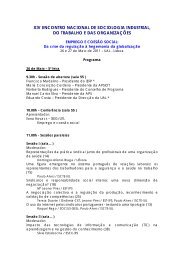Web-based Learning Solutions for Communities of Practice
Web-based Learning Solutions for Communities of Practice
Web-based Learning Solutions for Communities of Practice
You also want an ePaper? Increase the reach of your titles
YUMPU automatically turns print PDFs into web optimized ePapers that Google loves.
INTRODUCTION<br />
250<br />
A Process-Oriented and Technology-Based Model <strong>of</strong> Virtual <strong>Communities</strong> <strong>of</strong> <strong>Practice</strong>s<br />
The rapid, discontinuous and non linear changes<br />
<strong>of</strong> today’s economy, their qualitative and quantitative<br />
leaps (flux), the technological revolution,<br />
the collapse <strong>of</strong> time and space, and the increase<br />
<strong>of</strong> complexity are affecting not only the business<br />
environment, but also the education. If the new<br />
tasks is to educate students <strong>for</strong> highly dispersed,<br />
flexible, unstable organizations, with great emphasis<br />
on value reinventing processes, the educational<br />
community must increasingly address issues<br />
<strong>of</strong> identifying, understanding and articulating<br />
in<strong>for</strong>mation, experience and knowledge (Baets<br />
& Van der Linden, 2003). New styles <strong>of</strong> learning<br />
approaches characterized by efficiency, just<br />
in time delivery, solution orientation, knowledge<br />
applications and anywhere access <strong>based</strong> on learning<br />
process internet <strong>based</strong> are arising (Maureer<br />
& Sapper, 2001).<br />
The paradigms shifts in management educations<br />
require that students are not simply passive<br />
recipients <strong>of</strong> expertise but rather co-creators <strong>of</strong><br />
their Just in Time and action learning. <strong>Learning</strong><br />
is more characterised by interpretation, experimentation,<br />
problem solving than description and<br />
analysis. It’s a journey through the world in which<br />
individuals live, and through networks <strong>of</strong> selfknowledge<br />
and self-development (Baets & Van der<br />
Linden, 2003). Hence the learning environment<br />
should be considered as a place where different<br />
stakeholders (program heads, faculty, executives,<br />
director, corporate action learning sponsors, advisory<br />
board) and students mutually engage in<br />
developing new understanding, approaches and<br />
unbounded sets <strong>of</strong> perspectives.<br />
These conditions trigger a rethink <strong>of</strong> the traditional<br />
Business Schools and Universities models:<br />
new organizational <strong>for</strong>ms <strong>based</strong> on Virtual<br />
<strong>Communities</strong> <strong>of</strong> <strong>Practice</strong>s (VCoPs) are strongly<br />
recommended. There is no doubt that the concept<br />
<strong>of</strong> VCoPs is relevant in order to discuss learning<br />
approaches in Higher Education. Wenger’s approach<br />
gives us the possibility to analyse learning<br />
as a social practice that goes on at the micro-social<br />
level, largely through engagement in the tasks at<br />
hand (Lave & Wenger, 1991).<br />
Starting from the above considerations, this<br />
work is aimed at:<br />
• Defining an integrated VCoPs model supporting<br />
all the knowledge management cycle<br />
in a business school;<br />
• Integrating Knowledge Management organizational<br />
and technological aspects in a<br />
VCoPs model <strong>for</strong> a Business School;<br />
• Defining an integrated <strong>Web</strong> <strong>Learning</strong> and<br />
Knowledge Management (KM) system<br />
aimed at enhance learning opportunities<br />
both in daily researcher’s practices and in<br />
student’s learning experience.<br />
In order to address these points, at first we<br />
reviewed the CoPs literature to demonstrate that<br />
VCoPs are relevant organizational model <strong>for</strong><br />
emerging learning approach in business schools,<br />
then we propose an integrative model <strong>of</strong> VCoPs<br />
named “Virtual eBMS”, as a result <strong>of</strong> an empirical<br />
study <strong>of</strong> a higher education community,<br />
the e-Business Management Section (eBMS) <strong>of</strong><br />
Scuola Superiore ISUFI – University <strong>of</strong> Salento<br />
(Italy). Finally some results will be presented in<br />
terms <strong>of</strong> value created by the “Virtual eBMS”<br />
Community <strong>for</strong> Higher Education.<br />
VCOPS AS ORGANIZATIONAL<br />
MODEL SUPPORTING BUSINESS<br />
SCHOOLS<br />
Existing Literature on VCoPs<br />
For the purpose <strong>of</strong> our work the operational definition<br />
<strong>for</strong> Community <strong>of</strong> practices (CoPs) is “Groups<br />
<strong>of</strong> individuals who participate in a collection <strong>of</strong><br />
activities, share knowledge and expertise, and<br />
function as an interdependent network over an<br />
extended period <strong>of</strong> time with the shared goal <strong>of</strong>



